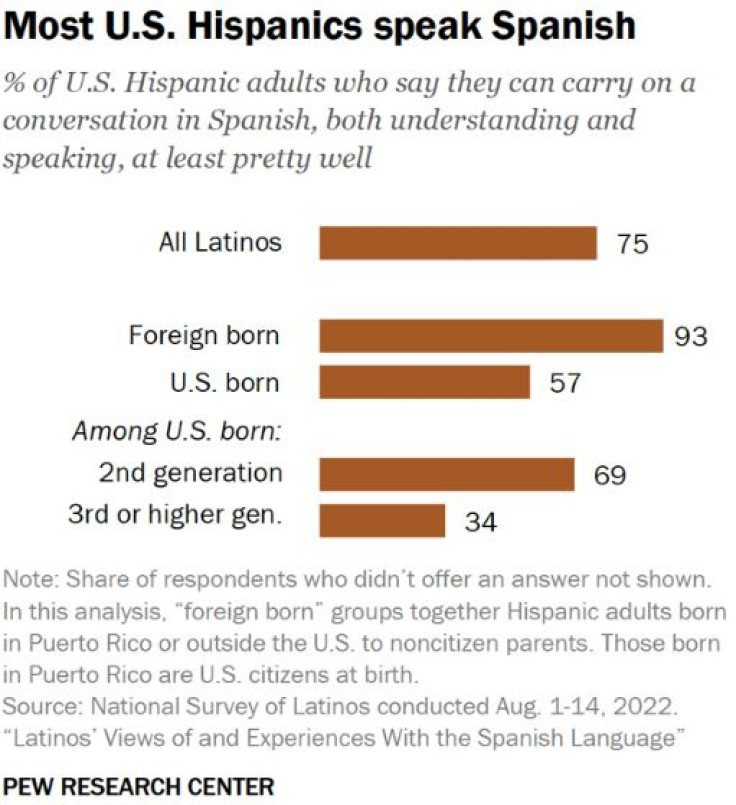
'No Sabo Kid' was a term originally used as a put-down to mock Latinos who lack fluency in Spanish, but has evolved into an online cultural phenomenon, boasting millions of memes and videos.
Younger generations born in the U.S. have reclaimed the insult, embracing their 'Latinidad,' a cultural identity with which they strongly identify. How are they striking back? Humor.
"I am a 'No Sabo Kid'. When we are embarrassed, we say we are 'embarazados' (a word play with pregnant in Spanish). We have never been to a Spanish-speaking country; we don't know how to roll our 'Rs'; we don't like 'salsa' and we eat our tacos with nothing on it," says a young TikToker in an illustrative vide, one of the millions that span across social media, where the hashtag #NoSaboKid has garnered over 494.7 million views.
There are also numerous family-made videos showcasing playful games, kid's common mistakes while speaking and various efforts made by Latino parents to teach their children Spanish - a vital skill, serving as a marker of identity for U.S. Latinos, but also as a significant means of communication.
Jacqueline Delgadillo, a writer born in Mexico and raised in Southern California, explained why she thinks Spanish is so tied to identity for Latinos in an interview with NPR: "There's a wide assumption that Spanish is the main language spoken across Latin America, and so if you don't speak it, then you're not really Latina or you don't have the right to really claim that identity."
She coninued: "But I think that's a huge misconception because there are so many languages that are spoken across Latin America. Spanish isn't even native to Latin America, right? And so to use it as, like, a metric of Latinidad is really - it's pretty ridiculous."
'No Sabo Kid': What Does it Mean?

The origin of the phrase 'No Sabo Kid' is rooted in the challenges posed by Spanish grammatical rules. 'No sabo' represents an incorrect expression for 'I don't know' in Spanish (the correct translation being 'no sé'). This mistake is common as it deviates from the usual conjugation pattern of the verb 'saber' - to know, in English.
In Spanish, the verb is typically conjugated with the first three letters - 'sab-' in almost all cases, with the exception of the first person singular. It's 'él sabe' ('he knows'), 'tú sabes' ('you know'), 'ellos saben' ('they know'), 'nosotros sabemos' ('we know'), but 'yo sé' ('I know'). Hence, the frequent occurrence of this error.
The term 'No Sabo Kid' is still used pejoratively to refer to children raised in the U.S. who have Latino parents but are unable to speak Spanish themselves.
"The term 'No Sabo Kid' is often used by people in a derogatory manner. What's worse is that I've come across videos on social media platforms like TikTok or Instagram where mothers are laughing at their children because they don't know how to speak Spanish, which I find a bit harsh. And, of course, this word is also used on playgrounds to make fun of these kinds of kids," the Spanish influencer Rocío Jimenez, who teaches Spanish in the United States, explained in a TikTok video.
'No Sabo Kids': How Many are They?

Latinos are on track to represent 20% of the U.S. population -they are currently 19.1% according to the U.S. Census Bureau- and are expected to continue growing in proportion in all projections, but not all of them speak Spanish.
A survey conducted and published in 2023 by Pew Research Center found that over 24% of all Latino adults say they can only carry on a conversation in Spanish a little or not at all. The report also showed that 54% of U.S. Latinos who don't speak much Spanish have been shamed because of it.
The Pew Research Center also highlighted that Latino identity is linked to views about Spanish: "U.S. Hispanics who consider their Hispanic identity to be extremely or very important to how they think about themselves are more likely than other Hispanics to say it's important for future generations to speak Spanish. They are also more likely to say it is necessary for someone to speak Spanish in order to be considered Hispanic."
In contrast, an increasing number of Latinos are neither fluent in native Spanish nor bilingual. The report reveals that 63% speak Spanglish, a combination of Spanish and English, at least occasionally, with younger generations being less likely to speak fluently. Almost two-thirds (65%) of third- or higher-generation Latinos state that they cannot carry on a conversation well in Spanish.
© 2023 Latin Times. All rights reserved. Do not reproduce without permission.







